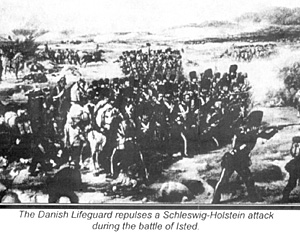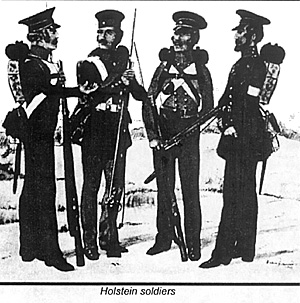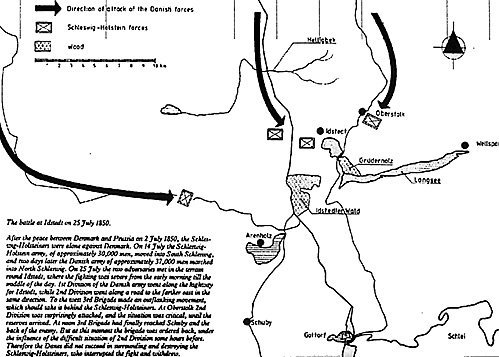(which appeared in the Times, 31th July 1850)
Schleswig, July 25.
"The general engagement expected after the skirmish of the outposts. described in my last letter, took place this morning. it was long and obstinately fought. was attended by great loss on both sides, and terminated with the total defeat of the Holstein army under General Willisen, which is at this moment (3 o'clock pm.) retreating through the town in tolerably good order to take up a position between here and Rendsburg.
It was known that the Danes would begin the attack at daybreak. or soon after: but they harassed the posts to the right of the Holsteiners by an irregular fire soon after midnight which kept the men under arms, and in some degree fatigued them before the battle itself' commenced. The morning was cloudy, at half past 2 [am.] it began to rain violently, and continued to pour without intermission till nearly 9; so far from the weather being so sultry, as for the last 10 days, it was even cold, and all that had been suffocating dust the day before was soon converted into mud.
At half-past 2 I rode out towards ldsted,. on the high road to Flensburg, where the center of the Holstein army was placed, holding a ridge of thickly-wooded hill and having in front a wide plain, stretching away almost in a level to the north as far as the village of Heligbeck, and west to Bollingstedt and the little river Treene on which the left wing of the army rested in the neighborhood of Gammelund. A quarter of a mile in advance of the ridge the Holstein batteries had been already placed, and awaited the attack of the Danes.
They pushed forward their guns, infantry, and chasseurs from their position between Heligbeck and Bollingstedt in the direction of the Chaussée; and after some skirmishing opened a heavy fire from their field pieces just at 3 o'clock; the Holsteiners replied from their batteries, and for nearly two hours it was a battle of artillery alone, the balls sweeping the plain to the right and left of the high road. The Danish infantry, as it advanced in heavy columns, suffered severely during this time, particularly from a well served battery of 24-pounders, which, when they struck ploughed completely through the ranks.
The infantry retired to form again, and the fire on both sides slackened on this point. By this time, 5 o'clock, the right of General Willisen's position at Unter Stolk and Wedelspang was attacked, but the Holstein chasseurs, who fought with the utmost determination throughout the day, held their ground in the woods and enclosed grounds against every attempt to dislodge them. They had not to contend with so heavy a cannonade, and the men are generally good marksmen: thus they at times even followed the Danes as they retired but were frequently obliged to fall back on their former position: if anything, they advanced during the action: later in the day it became apparent that the main attack of the Danes was not intended to be on that wing.
To the extreme left, also, the Danes were repulsed and driven to a considerable distance northward, and as the Holstein tirailleurs were evidently advancing, while the fire from the Danish center had abated, sanguine hopes were entertained of the result. But they were premature. The Danes advanced again, and the battle raged with more fury than ever, the artillery in the plain on all points firing incessantly. The roar of the heavier cannon, and the rush and hiss of the balls through the air, were the only sounds that fell on the ear; the irregular firing of the Riflemen and infantry was like the rattle of a toy compared to the clash of an enormous steam engine.
 The Danish Lifeguard repulses a Schleswig-Holstein attack during the battle of Isted.
The Danish Lifeguard repulses a Schleswig-Holstein attack during the battle of Isted.
Another hour passed with little movement of the troops, but a continual cannonade. All that was visible, except the flash and smoke of the guns, were the batteries galloping across the field from point to point, appearing for a few minutes on a rise of the ground, or under the canopy of smoke when lifted or driven aside by the wind. In the meantime, the usual scene presented by the immediate rear of an army in action was becoming more and more deplorable; troops of men carrying or supporting a wounded comrade, scarcely able to drag himself along: others carrying the dead, and laying them down with singular care, as if they were only asleep, and might be awakened by too rough a motion.
The thought crossed the mind involuntarily that the attention had been better bestowed on the living of whom too many were in sore need of it. There was a deficiency of wagons to carry the wounded back to Schleswig and moreover, the peasants did not relish the task of driving so close up to the firing. It required something like threats from the soldiers to get the Boer, as they call him, who in any circumstances moves but slowly. under the present ones to move at all: but it was generally done at last, though for the scarcity of vehicles there was, unhappily, no remedy. The wounded horses, if the case is hopeless, are shot, and every now and then the report of a merciful musket putting an end to the agonies of some poor animal, is another of the many episodes of the conflict that a spectator has leisure to observe: but they are but episodes: the great rush of battle goes on, perfectly reckless of life or suffering in any form.
At 7 o'clock the effect of the firing began to appear all over the field: scattered huts and farm-houses that had been set on fire by the shells. and were burning unheeded. In a Holstein battery placed to the left of the Chaussée a powder wagon, struck by a shell, exploded and killed four horses and two men. I crossed a subaltern officer attached to this battery later in the day, while he was describing to some comrades his furchthar pech. or terrific bad luck, at this point. He said he had had three guns dismounted, his horse shot from under him, and a powder-wagon blown up, within a quarter of an hour. I thought his own escape might have been considered a piece of good luck to balance the opposite. The battle went on, still without apparent result the Danes had not advanced either on the right or left and it was becoming evident that the center was the point on which all their strength would be directed.
To the left of the Jagers of each army had been engaged on the open ground towards Bollingstedt and Heligbeck but their fire was hardly noticed amid the thunder of the cannonade on the center: but at 7 o'clock straggling parties of Danish prisoners began to be brought to the rear, most of them wounded. In the latter case they were treated as well by their late opponents as any of their own comrades could have been. They were sent on to Schleswig as quickly as possible, and often side by side on the same bundle of straw with a German. In the midst of national hatred, displayed in its fiercest form, there was no trace of individual animosity to be discovered, nor did a word of insult or reproach pass between any of the hundreds of rival races thus brought into contest. it seemed as if they both submitted silently to some overwhelming destiny with which neither could contend.
The changes of the line of battle from 8 o'clock till between 10 and 11 were scarcely perceptible. The Danes had again retired, and the conflict was continuing on the right and left wing with the same result: the Holsteiners were holding their ground. But the hours that had elapsed since daybreak, and the exertions made in repelling the repeated attacks, had told on the physical strength of the Holsteiners, and it was beginning to be seen that they had to deal with an enemy that would grant then no respite. Other signs of disorder, and of that state of matters for which there is no better name than "something wrong," also began to appear, even to an unprofessional eye.
 Holstein soldiers
Holstein soldiers
The number of officers had always been two small, and now whole companies had with them only a few sergeants or corporals, who have not the influence of their superiors: the Danish rifles had disposed of most of the latter Several of the infantry were mere recruits, young, and brought into fire for the first time. They wavered, and became unsteady. Large groups of soldiers of different regiments were seen gathering in the rear, with no one to rally them; others were straying away in the fields and woods or going further to the rear; the staff were too few in number, and, like the troops, had been too hard worked; most of them had ridden down three or four horses each, and still the officers at distant points were heard complaining of the want of orders.
The ammunition had begun to grow short, and although a supply was instantly sent up from Schleswig, the wagons got mixed up with the straw and forage carts that covered the high road, and were not extricated with sufficient celerity. The Danes had as yet gained no ground, but it was just as certain they were not beaten, and at midday, when they made their last and successful attack, it was seen why it had been impossible to beat them. They had a strong reserve, which, fresh and vigorous, was sent against the Holstein force, of which almost every available man had been for many hours engaged.
The advance was covered by a larger number of guns than had yet been brought into action, and by a strong body of cavalry. The firing was now for an hour heavier than ever, and at last the Holstein center gave way and retreated on Schleswig the right wing bent back and retired towards the town; the left fell back through the open ground to the west. By a quarter past 2 the army was m full retreat, but not in disorder; nor were they molested in retiring by the enemy.
The members of the Holstein Government, who were in Schleswig, fled immediately to Kiel, on hearing that the battle was lost; all the officials also left the town; the Post-office was shut, the doors locked, and all business suspended. A train of carts, wagons, tumbrils, and cannon passed slowly through the town from 3 till 5 o'clock; the inhabitants brought out refreshments for the troops, which they distributed as they went along.
Of the loss in killed and wounded no accurate notion can be formed; about 400 Danes and Germans lie in the Schloss of Gottorp, part of which is converted into a hospital. But those who can bear transport are sent on to Kiel and Altona, while those who fell in the last and most fierce attack have not been brought in; in the range of woods to the right. and the wild heaths to the left, there must also be hundreds who have not been picked up, but who lay on the field probably all last night.
To the west, beyond Gammelund, a Danish prisoner stated that a battalion of his corps. Chasseurs, got among the bog and morass of what is called the Moor, and were nearly all shot down by the Holsteiner Riflemen before they could extricate themselves.
The Holsteiners retreated by the Chaussée along the south bank of the Schlei towards Eckernforde. Colonel von der Tann covered the retreat and before quitting the town threw up a barricade in the main street to impede the march of tile Danes.
The action was fought on both sides with great obstinacy, and the Holstein troops generally behaved gallantly for so young an army. The Danish soldiers are on the average much older men. The Holsteiners must have underestimated the force of the Danes, for they cannot even now explain how the enemy could have brought up fresh troops after three attacks. The victory, that may be called the battle of Idstedt, is decisive for the present of the fate of the duchies."

More Battle of Isted (Idsted)
-
Introduction
Report on Battle of 24th July 1850
Report on Main Battle of 25th July 1850
Jumbo Map (extremely slow: 137K)
Back to Clash of Empires No. 7/8 Table of Contents
Back to Clash of Empires List of Issues
Back to Master Magazine List
© Copyright 2000 by Keith Frye
This article appears in MagWeb (Magazine Web) on the Internet World Wide Web.
Other military history articles and gaming articles are available at http://www.magweb.com